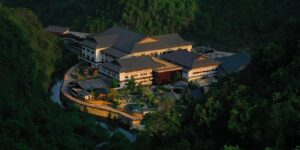




These Concept Rooms, physically materialised in collaboration with a group of companies exhibiting at the event, will generate new knowledge on how to respond, from an interior design perspective, to the needs of the new customer profiles of hotels and restaurants and, therefore, project into the future what hospitality spaces will be like for new travellers and users. These spaces will be used to analyse usability, user interaction with objects and their emotional response to interior design, using neuromarketing techniques.
Senator Hotels & Resorts, a family-run hotel group with more than 55 years of experience and 36 establishments located in Spain and the Dominican Republic, has been the chain in charge of proposing the first of the challenges, based on the design of a family holiday hotel room. As Marta Galdo, Director of Communication and Marketing, says: “For us it has been a very enriching experience as we have been involved in the project from the beginning to the final phase, learning and improving with the development of the project, the avant-garde of design reaches the beach of Senator Hotels & Resorts with this bold proposal by Juli Capella’s studio. This commitment by AMBIT and interihotel is an important step forward for the expansion and enhancement of our brand, the most holiday-oriented brand in the national hotel industry”.
Those responsible for turning Senator’s proposal into reality have been Capella-García Arquitectura, a studio dedicated to urban planning, architecture and interior design and founded in 2001 by Juli Capella, Miquel García and Cristina Capella. Specialising in the hospitality and entertainment sectors, they have designed a ” beach postcard room” called the Vitality Haven Concept Room, a cabin in which “the bed is like a boat floating peacefully in a cosy cove, surrounded by a shore where the waves gently pound, making up the bathing and body care area, which extends towards some fine sand dunes where you can play, drink, work or rest: the living area. Next to it, a small garden oasis, the terrace, for vital or contemplative outdoor rituals”.
The traveller profile targeted by this temporary home is a mix of the Silver Traveller, an energetic adult looking for active relaxation, the Millennial Parent, who enjoys quality experiences with their children, and the Committed Traveller, who travels with ecological commitment. To connect with this profile, the studio offers “an innovative scenario that can be customised and used in a unique and changing way according to the user’s wishes. To shape it, the designers have used a palette of warm materials (no metal or glass and its reflections): only textiles, textures, wood and rustic ceramics. The colours are those suggested by the typical postcard of a Mediterranean cove: the rocks with their browns and tans, the sand with beige and ochre, the sea foam with white tones, the water with turquoise blue… All under a radiant sky with a protective orange sun. In the evening, the room becomes a cosy refuge, with soft lights and subdued colours: what was once a space for morning enjoyment is now a chill-out, what was once a place to work in peace is now a bustling table to share a few drinks”.
From the studio, they value the stimulus and commitment that participating in interihotel entails: “A demanding exercise by interihotel, which must fulfil a meticulous briefing, with a hotel chain, Senator, that makes you come up with the proposal. […] It is in this dilemma, between going a little further, not allowing ourselves to be dragged along by what is reasonable, that we wanted to navigate, but without doing anything crazy”.
On the other hand, UDON, a restaurant group founded in 2004 and which currently has more than 70 restaurants in 5 countries, has launched a challenge consisting of the design of a new restaurant space aligned with the chain’s aesthetics. In the words of J. Pascual, CEO of UDON: “Participating in this project and working together with Francesc Rifé Studio has allowed us to share visions and new trends in the conceptualisation of spaces and interior design applied to the world of catering. The Concept Room has been a great challenge for the Rifé Studio team, which has been able to create a functional and aesthetically very aligned concept with the essence of Udon in such a small space. Without a doubt, a very enriching experience for the whole team”.
Francesc Rifé Studio, founded by the industrial designer and interior designer Francesc Rifé in 1994, has been the studio in charge of the design of this space, called Eco-Jin Concept Restaurant, a term that combines “eco” (short for “ecology”) and “jin” (Japanese for “person” or “individual”), which is used to describe someone who lives in an ecological and sustainable way. In the words of Francesc Rifé, “the studio wanted to take advantage of a classic element of design, normally associated with the home, to paradoxically give a sense of modernity to the project. This concept room with a façade and flexible partitions is configured through the use of wooden Venetian blinds. The characteristics of these lattices make it possible to achieve a lot with very little: rhythm, versatility and a sharp inside-outside connection. In order not to turn it into a theme restaurant, the use of materials is limited to wood and textiles which, together with strategically hidden lighting, provide an intimate atmosphere. The layout is designed both for individuals and for groups, which is why a large continuous bench is a practical solution to the polyvalence required by the new restaurant spaces. The general layout is completed with a bar, which serves as a storage area, and a reserved area with nods to the popular Japanese tatami dining room. The red colour of this last room is intended, above all, to convey a message of renewal and to convince the visitor that something very new can also be created with traditional elements”.
The user profile targeted by this restaurant is one that consumes with sustainability in mind, pursuing a positive social and environmental impact at all times (Eco-Jin).
Francesc Rifé Studio highlights the challenge and the stimulus that participation in interihotel represents: “On the one hand, it has been a great opportunity to have an ephemeral laboratory in which we could experiment with ideas that could later be applied to permanent designs and, on the other hand, a great challenge to have to start from concrete brands and products. The path we have chosen is to take the visitor from everyday and intimate elements to deep and collective reflections”.
Besides, AMBIT’s Interiors Living Lab is once again offering visitors five Concept Rooms in a holographic virtual reality installation, offering the possibility of visiting each of the spaces and interacting in real time with other people in different locations through their holograms.
More information: www.interihotel.com
RELATED ARTICLES

interihotel connects people and brands that defint the interior design of hotels and restaurants.
MOST READ




